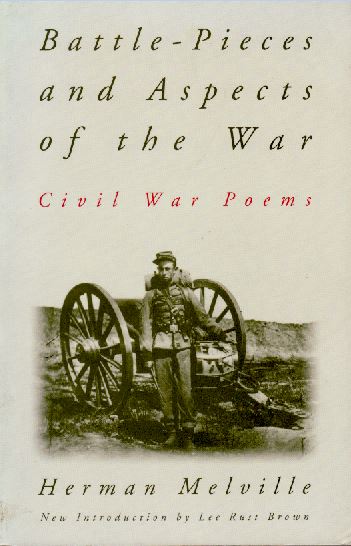The Civil War Poetry of Herman Melville
Posted By Norman Gasbarro on September 9, 2016

Herman Melville was born in New York City on 1 August 1819. His most famous work, Moby-Dick, was a novel that was published in 1851 and was based on his own experiences at sea in the 1840s. But by 1857, he stopped writing fiction and turned to other endeavors. His 1866, his first book of poems was published, Battle Pieces and Aspects of the War, which to him was a personal meditation and reflection on his first-hand knowledge of many aspects of war-time America. Critics have described this Civil War poetry as realistic, grievous and disconsolate. The work itself is 72 poems covering a broad range of singular topics from specific battles to brief biographical sketches.
Melville died at his New York City home on 28 September 1891.
The 1995 De Capo Press edition of Battle Pieces features an introduction by Lee Rust Brown followed by an exact reproduction of the original publication by Harper and Brothers, New York, 1866. Battle Pieces is also available free through the Gutenberg Project.
An example from the original is reproduced below. During the war, Melville met Abraham Lincoln briefly, and then reflected on his assassination in “The Martyr.”
The Martyr
Indicative of the passion of the people on the 15th of April, 1865
Good Friday was the day
Of the prodigy and crime,
When they killed him in his pity.
When they killed him in his prime
Of clemency and calm —
When with yearning he was filled
To redeem the evil-willed,
And, though conqueror, be kind;
But they killed him in his kindness,
In their madness and their blindness,
And they killed him from behind.
There is sobbing of the strong,
And a pall upon the land;
But the people in their weeping
Bare the iron hand:
Beware the people weeping
When they bare the iron hand.
He lieth in his blood —
The father in his face;
They have killed him, the Forgiver —
The Avenger takes his place,
The Avenger wisely stern,
Who in righteous shall do
What the heavens call him to,
And the parricides remand;
For they killed him in his kindness,
In their madness and their blindness,
And his blood is on their hand.
There is sobbing of the strong,
And a pall upon the land;
But the People in their weeping
Bare the iron hand:
Beware the People weeping
When they bare the iron hand.
 ;
;



Comments